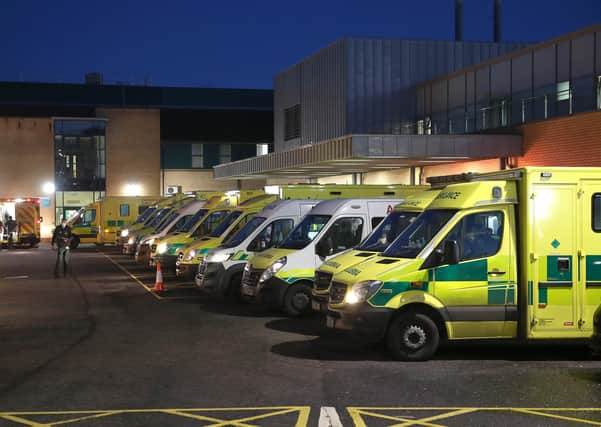NI health service braced for mid-January surge after record number of coronavirus cases, says BMA NI chair Dr Tom Black


A total of 1,566 new cases were recorded on Tuesday – the highest total ever reported for a single 24-hour period by the Stormont health department.
The latest figures also show that another 14 people with the virus have now lost their lives, following the deaths of 51 people with the virus between Christmas Eve and Monday.
Advertisement
Hide AdAdvertisement
Hide AdHealth Minister Robin Swann said the rise in positive cases has been shown particularly in those aged in their 20s and 30s.
“The rise in this age group may be linked to behaviour and although young adults may think they are immune to Covid-19, their relatives and loved ones are not,” Mr Swann said.
“We must all redouble our efforts to push down infection rates. That does not mean some people must make sacrifices and restrict their lives while others do not.”
The chairman of the British Medical Association’s Northern Ireland committee, meanwhile, has said the health service is expecting to feel the impact of the rise in cases in the middle of next month.
Advertisement
Hide AdAdvertisement
Hide AdDr Tom Black, speaking to the News Letter, said: “Our big concern is that, in the second and third week in January, there will be a peak in terms of GP access, emergency departments and wards.”
Dr Black did, however, urge caution about the spike in cases recorded today.
“You have to be careful with statistics, especially around holiday periods,” he said.
“The numbers might be ascribed to a 24-hour period when there was a backlog over the holiday period.
Advertisement
Hide AdAdvertisement
Hide Ad“But it is reasonable to say that our figures are high and significantly higher than the Republic of Ireland. They had over 700 yesterday in a 24-hour period and we are getting figures much higher than them. Per capita, that would mean we have more than double their rate of infection.
“The numbers in the south-east of England, around London, are very high at the moment. We don’t seem to have reached those heights per capita but it is obvious that due to socialisation over the holiday period that we would expect the numbers to be higher in Northern Ireland in the next one-to-two weeks.”
He continued: “We’ve always been concerned that the second and third week in January would be the peak of infection because of increased socialisation, and because of the holiday period and the changed dynamics that brings with inter-generational mixing.”
Dr Black stressed, however, his hopes that better treatment could mean deaths don’t increase as much as they might have otherwise.
Advertisement
Hide AdAdvertisement
Hide Ad“We would hope that the death rate won’t significantly increase because doctors and nurses have become so good at preventing deaths with improved treatments,” he said.
“But there’s no doubt that the pinch-point, the bottleneck in terms of services, will be on medical wards in hospitals. We think that that’s where the biggest problems will be in the middle of January.”
Asked about the impact of the current lockdown restrictions, Dr Black said: “The lockdown will have an effect later in January and will mitigate some of the risks that we’re facing.
“In terms of the vaccination programme, we’ve already vaccinated a lot of people in nursing homes and a lot of staff, plus we’re going to vaccinate the over-80s during January, so we would hope to see a reduced death rate in February. But in terms of pressure on the health service it will probably be March or April before we see the lifting of the pressures on hospitals.
“And remember, the important thing about the number of Covid patients is that if you can reduce it then you can provide health services to patients for other problems.”